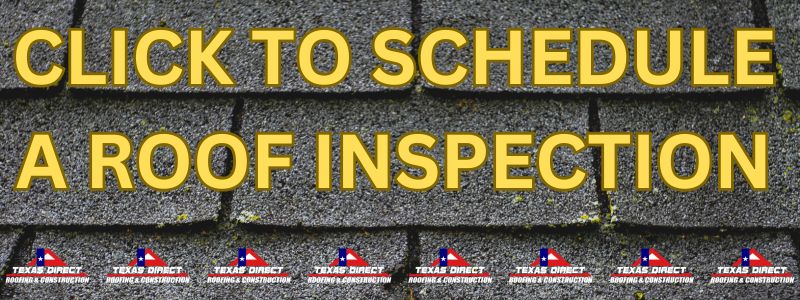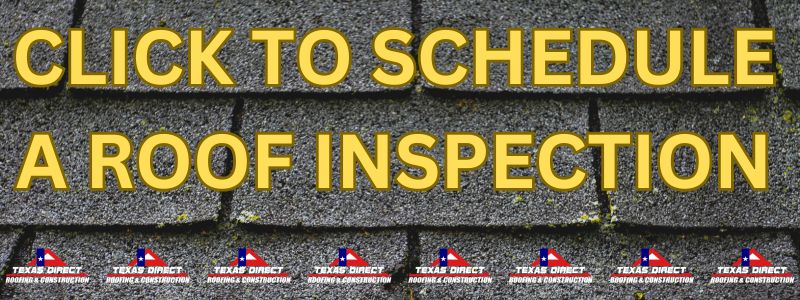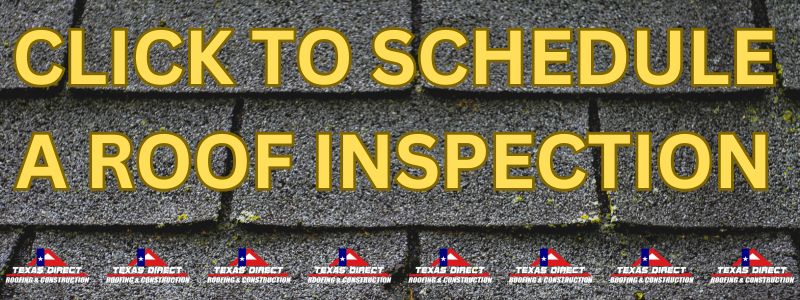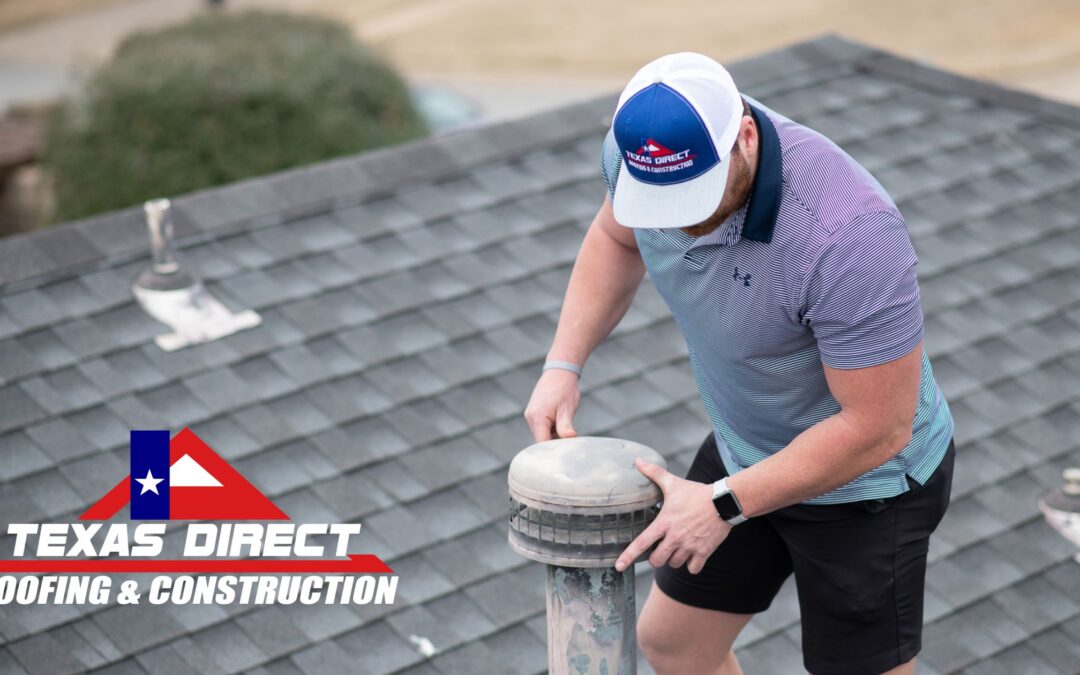Mason was under contract to buy his first home when the home inspector noticed hail damage on the roof and recommended a roof inspection. He took the inspector’s advice and called us, after an insurance agent also told him the roof probably wasn’t insurable. The damage was minimal – there weren’t even loose shingles. Nevertheless, the seller paid to replace it for Mason, and we saved him from potential leaks or a costly roof replacement down the road.
Roof inspections take various forms, from thorough physical evaluations conducted by experienced inspectors to drone inspections. Knowing what inspectors focus on—like surface materials, structural integrity, and ventilation systems—can empower you to understand potential issues before they escalate.
This article’ll discuss the main two types of roof inspections, what we look for, and the importance of an annual inspection. We’ll also weigh the pros and cons of DIY inspections versus hiring professionals, helping you make informed decisions that could save you money in the long run.
Types of Roof Inspections
Again, regular roof inspections are crucial for maintaining the durability of your roofing system. A well-maintained roof protects your property from water damage and helps prolong the lifespan of roofing materials. There are two primary types of roof inspection: physical roof inspections and drone inspections. Each method serves a distinct purpose and can offer unique insights into the condition of an entire roof.

Drone Inspections
Drone inspections are a newer, advanced method for assessing roof conditions. Roofing companies in Texas have begun to adopt this option, because it offers a safer and sometimes more thorough option for conducting roof inspections. With a drone, a roof inspector can capture high-resolution images and videos of the roofing system from various angles, which can be especially useful for steep, hard-to-reach, or unsafe areas.
Drone inspections also reduce the risk of causing additional damage to the roof that could occur during a physical inspection. An inspection report generated from a drone inspection provides visual evidence and a detailed overview of the roof’s condition without requiring the local roofer to be on the roof physically.
The cost of a drone inspection from our team is the same as a physical inspection – always complimentary.

Physical inspections
Physical inspections examine the condition of roofing materials, looking for signs of damage such as water damage. A roof inspector conducts a visual inspection from the ground and then climbs and inspects the entire roof, including roof penetrations like vent pipes and attic ventilation systems.
We follow up with a detailed report outlining any issues and recommending repairs. This inspection ensures the roof decking and underlayment are intact, reducing the need for costly repairs. Roofing contractors and companies emphasize the importance of regular inspections to identify problems early on.
Whether you choose drone or physical, the two types of roof inspections include:
- Basic Roof Inspection: Visual evaluation from the ground or roof surface.
- Detailed Roof Inspection: Includes interior attic inspection and detailed exterior check.
The second option is always our preference, because we want to make sure we have a real look at the true condition of your roof.
What Inspectors Look For
When a roof inspector evaluates your roof, we perform a comprehensive assessment to ensure every aspect of the roof’s integrity and functionality is up to standard. This can prevent minor issues from becoming major problems that cause water damage or require costly repairs. The inspection process typically includes a detailed assessment of various elements such as the condition of the surface materials, the roof’s structural integrity, and the ventilation system’s effectiveness. The inspector will also look for roof penetrations, such as chimneys, skylights, and vent pipes, to ensure they are adequately sealed and leaks-free. With a trained eye, the inspector identifies potential problems and advises on suitable maintenance or repair solutions.
Surface materials
The first line of defense in protecting a home from the elements, surface materials, are scrutinized for their condition and performance. Inspectors look for:
- Shingle Condition: Are there missing, damaged, or aging shingles?
- Tile Integrity: Do clay or concrete tiles show cracks or signs of displacement?
- Metal Panels: Are metal roofs securely fastened, rust-free, and without dents that could harbor water?
- Flat Roof Surfaces: Is the membrane intact, properly adhered, and without blisters or wrinkles?
Each type of roofing material has its own set of criteria that inspectors examine, emphasizing identifying any factors that compromise the material’s effectiveness and longevity.
Structural integrity
The inspector turns their attention to the underlying roof structure, which is crucial for overall performance. Structural integrity checks include:
- Roof Decking: Is the sheathing solid and free of rot or warping?
- Rafters and Trusses: Are these structural elements free of damage or deformities?
- Chimneys and Skylights: Is the framing around these features secure and stable?
Ensuring structural integrity prevents catastrophic failures and prolongs the functional lifespan of the roof.

Ventilation systems
Proper attic ventilation is vital in regulating temperature and humidity levels within a home. An inspector assesses:
- Intake Vents: Are soffit vents unobstructed and allowing air to enter the attic?
- Exhaust Vents: Do ridge vents or other exhaust mechanisms effectively expel warm, moist air?
- Ventilation Balance: Is there a proper balance between air intake and exhaust?
Ineffective ventilation can lead to moisture accumulation, which is a precursor to mold growth and can compromise roofing materials and structural components.
In conclusion, regular inspections by a qualified roofing professional are important as they provide detailed reports of the roof’s condition, allowing homeowners to address issues early. This proactive approach not only prevents water damage and other extensive problems but also helps maintain a well-maintained roof, which is integral to the overall health of a building structure.
Importance of Regular Roof Inspections
Regular roof inspections are a cornerstone in maintaining the health and longevity of any roofing system. Whether it’s a residential home or a commercial building, the roof plays a crucial role in protecting the structure from the elements, and thus requires attentive care. By entrusting this task to a professional roofing contractor, property owners can ensure that all components of their roof are evaluated for potential issues.
A professional roof inspector can provide a comprehensive assessment of the entire roof, examining roofing materials, roof penetrations, vent pipes, and the condition of roof decking. They are trained to spot early signs of damage that may be invisible to the untrained eye. Regular inspections uncover issues such as missing or damaged shingles, cracks in the roof membrane, blockages in the gutters, and problems with attic ventilation that, if left unchecked, could lead to extensive water damage and costly repairs.
Roofing companies often tailor their inspection process to address the specific needs of different roofing materials and designs. The average cost of a roof inspection varies, but investing in regular inspections can save homeowners money in the long-run by preventing small problems from becoming major expenses. Moreover, professional roof inspections can be invaluable for insurance claims, as a detailed report from a licensed inspector can facilitate the claims process with an insurance company.

Preventing Costly Repairs
Neglecting regular roof inspections can often lead to the progression of minor issues into severe problems. For example, a small leak may seem inconsequential, but over time, it can allow water to infiltrate the roofing system and cause significant water damage to the roof decking and interior of the home. By the time the damage becomes apparent, the costs of repair can be substantial.
Professional roof inspections help identify these issues when they are still manageable, effectively preventing costly repairs down the line. Inspectors look for many things during their assessment including:
- Signs of water damage or leaks
- Shingle deterioration or loss
- Damaged or clogged gutters and downspouts
- Issues with flashing and seals around roof penetrations
- Signs of mold, algae, or rot
- Compromised attic ventilation
Addressing these concerns promptly through minor repairs can prevent the need for more extensive and expensive interventions. Furthermore, regular inspections ensure that the roofing system is in its best condition to handle severe weather, reducing the likelihood of emergency repairs after storms or extreme conditions.
Extending Roof Lifespan
Every roofing system has an expected lifespan which can be maximized with proper care. Regular roof inspections play a pivotal role in extending the life of a roof. During a visual and physical roof inspection, professionals will note any deviations from the expected wear of roofing materials and components and can recommend maintenance or repairs to address these issues.
Maintaining a well-maintained roof involves tasks that could be as simple as clearing debris from the roof surface or as involved as replacing worn or damaged materials. By catching and addressing these aspects early on, the cumulative effect of multiple inspections and corresponding minor repairs not only ensures a more robust roofing system but also directly impacts the overall lifespan of the roof.
By scheduling regular inspections from a professional roofing contractor, homeowners and building managers can have peace of mind knowing that one of their property’s most vital defensive features against the weather is in good condition. Proper maintenance guided by regular professional evaluations prolongs the structural integrity and functionality of a roof, providing long-term cost savings and enhancing the safety and comfort of those beneath it.
DIY vs. Professional Inspections
Deciding between conducting a roof inspection yourself (DIY) or hiring a professional to do it can be a significant decision that impacts your roof’s longevity and your safety. Homeowners may consider DIY inspections for an immediate and cost-saving evaluation, while professional inspections are recognized for their thoroughness and expertise. Understanding the pros and cons of DIY inspections and the clear benefits of hiring a professional can help you make an informed choice that best suits your needs and the condition of your roofing system.
Pros and cons of DIY inspections
Conducting a DIY roof inspection might seem like an easy way to save money and get an immediate sense of your roof’s condition. However, assessing your roof without professional expertise can have drawbacks. Here’s a bullet-point list of pros and cons:
Pros:
- It’s the flexibility to look over whenever you get a chance.
- Immediate identification of obvious roof issues.
Cons:
- Safety risks due to falls while on the roof.
- Insurance will likely still require a professional inspection
- Potential for missing subtle signs of damage.
- Lack of professional tools and knowledge for comprehensive evaluation.
- Difficulty in assessing the condition of roofing materials with accuracy.
- Poor inspection could lead to undetected water damage, affecting insurance claims.
- Misjudging the condition could lead to larger, costly issues in the future.
Benefits of hiring a professional
Opting for a professional roof inspection can have major benefits for your home’s protection and your peace of mind. Professionals bring experience and an analytical eye to the task, offering a detailed report that DIY efforts cannot match. Here’s a bullet-point list of benefits:
Benefits:
- Safety is ensured as professionals are trained to navigate roofs.
- In-depth knowledge of roofing materials and signs of damage.
- Access to advanced tools for precise issue detection, even in initial stages.
- Can provide a detailed report that is useful for maintenance or insurance claims.
- Professional roof inspections often include attic ventilation and roof decking checks.
- Able to provide an accurate estimate of the average cost of roof repairs or replacement.
- Regular professional inspections can identify and extend the life of roofing components.
- Some warranties or insurance policies require professional inspections to remain valid.
Homeowners can choose the most suitable inspection method by understanding the pros and cons of DIY roof inspections and the benefits of hiring a professional. Regular roof inspections, whether conducted by the homeowner or a certified roofing professional, are essential in preserving a well-maintained roof.

Closing Summary
In conclusion, regular roof inspections are crucial in maintaining a well-maintained roof and avoiding water damage. Professional roof inspections ensure that all components of the entire roof, including roofing materials, roof penetrations, vent pipes, and attic ventilation, are thoroughly examined by a roofing professional. Roofing contractors perform both visual inspection and physical roof inspection to identify signs of damage and provide a detailed report, which is vital for both homeowners and insurance companies.
The average cost of roof inspection varies, but investing in these regular inspections can save considerable money by preventing the need for extensive roof repairs. Roofing industries advocate for regular inspections to extend the lifespan of various roofing systems. During the inspection process, a professional roofing contractor can also assessf the roof decking the condition o.
Types of roof inspections range from basic to comprehensive, with the latter encompassing in-depth analysis and sometimes employing advanced technology. Roof inspection costs are a small price to ensure that your roof remains in optimal condition. Ultimately, enlisting the services of a professional roof inspector is a proactive measure to protect your home.

